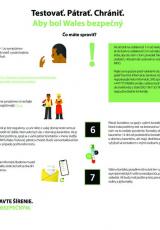The NHS Wales Test, Trace, Protect service is now well underway across Carmarthenshire to track the virus and give extra protection to our communities.
Anyone who has been in contact with someone with confirmed COVID-19 may be contacted as part of this and asked to self-isolate for up to 14 days, and to request a test if they show any symptoms of the virus. A contact advisor will get in touch with the individual to provide advice and support.
Test, Trace, Protect works by:
- Testing those people have coronavirus symptoms, asking them isolate from wider family, friends and their community whist taking a test and waiting for a result. Read further information on what you can do to protect yourself and others. If you are displaying symptoms, you can apply for a coronavirus test.
- Tracing those people who have been in close contact with the symptomatic/tested person, requiring them to take precautions through self-isolation (see above). Read further information on contact tracing and how it will work.
- Providing advice and guidance, particularly if the person who has symptoms or their contacts are in the at risk group.
- Ensuring that if the symptoms are not due to coronavirus, individuals and their contacts can get back to their normal routines as soon as possible.
Test – Symptoms and when to take a test
The main symptoms of coronavirus are:
- a high temperature: this means you feel hot to touch on your chest or back (you do not need to measure your temperature)
- a new, continuous cough: this means coughing a lot for more than an hour, or 3 or more coughing episodes in 24 hours (if you usually have a cough, it may be worse than usual)
- a loss or change to your sense of smell or taste: this means you’ve noticed you cannot smell or taste anything, or things smell or taste different to normal
Most people with coronavirus have at least one of these symptoms.
If you develop symptoms of coronavirus, you should take a coronavirus test within the first five days of developing symptoms – this is when the test is most effective.
Test – Critical workers
Critical workers, such as those in health and social care, local authorities, police, fire, education, food, retail, transport, public services, are encouraged to get a test if they have symptoms. Preferably, they can do this by speaking to their employer. Alternatively, they can contact the local Covid Enquiries team direct on 0300 303 8322 or by emailing CovidEnquiries.hdd@wales.nhs.uk (please note this is for critical workers only and details on how symptomatic members of the public can access testing is below).
For the full list of critical workers eligible for a test visit the Welsh Government website.
Test – Members of the public
Symptomatic members of the public can apply for a test by visiting the Welsh Government website and choosing either a mass drive-through testing centre or ordering a home testing kit. Those without digital access can apply for a test by calling the free number 119 (between 7am-11pm) and people with hearing or speech difficulties can call 18001 119.
Trace – How will the Test, Trace, Protect service contact me?
You’ll initially be contacted by telephone by a contact tracer. Calls will only come from this number: 02921 961133.
For children under 16 the contact tracer can speak to either of the following:
- an adult on behalf of the child
- the child if their parent or guardian has consented
If you miss a call from the service, you will be called again the following day. You will not receive a voicemail, but if you ring the number back you will hear a message confirming that you were called by NHS Wales Test, Trace Protect service. Calls from this number are outbound only, so you will not be able to speak to a contact tracer and will need to wait for a call back the following day.
Contact tracers will NEVER:
- Ask you to dial a premium rate number to speak to them (for example, those starting with 09 or 087)
- Ask you to make any form of payment
- Ask you for any details about your bank account
- Ask for your social media identities or login details, or those of your contacts
- Ask you for any passwords or PINs, or ask you to set up any over the phone
- Ask you to purchase a product
- Ask you to visit any website that does not belong to the Government or NHS
- Ask you to download any software to your device or ask you to hand over control of your PC, smartphone or tablet.
You can report suspicious calls and emails via 101, online or by emailing contactcentre@dyfed-powys.pnn.police.uk.
Trace – What will I be asked?
If you test positive you will be asked to share details of contacts you may or may not live with, and with whom you have been in close proximity on any occasion during a period beginning up to two days before you started experiencing symptoms, including:
- someone within 1 metre of you with whom you have had a face-to-face-conversation, had skin-to-skin physical contact, you have coughed on, or had other forms of contact within 1 metre for 1 minute or longer
- someone within 2 metres of you for more than 15 minutes
- someone you have travelled in a vehicle with – or seated near you in public transport
This information will help the contact tracing teams to identify how quickly the virus is spreading and whether there are hotspots of infection.
This is not about enforcement or surveillance and is in the interests of protecting your health and the health of your contacts. These contacts will be asked to self-isolate for 14 days to ensure that they do not have the virus. They will only be advised to take a test if they are displaying symptoms – testing while asymptomatic can generate false negatives and is not recommended for these reasons.
Trace- Keeping records of staff, customers and visitors
It is now compulsory for hospitality businesses and other high risk settings to collect contact details to support the Wales NHS Test, Trace and Protect service. Details of staff, customers and visitors need to be recorded. This is to prevent the spread of COVID-19.
This applies to:
- Hospitality, including pubs, bars, restaurants and cafes
- Cinemas
- Close contact services including hairdressers, barbers, beauticians, tattooists, sports and massage therapists
- Swimming pools, indoor fitness studios, gyms, spas or other indoor leisure centres or facilities.
To comply you need to:
- Maintain records of staff, customers and visitors to your premises for 21 days. This can either be done on paper or electronically but should adhere to General Data Protection Regulations (GDPR).
- Explain why you’re asking for contact information and encourage them to provide it.
- Display a notice on your premises or on your website. There is a poster you can download and print on the Business Wales website
What information do you need to record
You will need to collect the following information. This is regardless of any social distancing measures that you have put in place.
Staff
- The names of staff who work at the premises.
- A contact telephone number for each member of staff.
- The dates and times that staff are at work.
Customers and visitors
- The names of customers or visitors, or if it is a group of people, the name of one member of the group – the ‘lead member’.
- A contact telephone number for each customer or visitor, or for the lead member of a group of people.
- Date of visit and arrival and departure time.
What the records will be used for
NHS Wales will only ask for your records where it is necessary. This will either be because someone who has tested positive for COVID-19 has listed your premises as a place they have worked at, or visited recently, or because your premises has been identified as the location of a potential outbreak.
If you’re asked to do so, you should share the information of staff, visitors and customers with the NHS Wales Test, Trace, Protect service as soon as possible. Calls will only come from this number: 02921 961133. You shouldn’t share the contact information with anyone else.
Complying with the regulations
If you do not comply with these record keeping requirements, then our enforcement officers could issue a ‘Premises Improvement Notice’ or a ‘Premises Closure Notice’, or both depending on the circumstances. You can find out more about these requirements on the Welsh Government website.
Protect – Self-isolation advice
If you or the person you care for or anyone else in the household gets sick with possible COVID-19, then you must isolate.
- The person who is sick must stay in the house for 10 days from the start of symptoms
- Everyone else in the household must stay at home for 14 days
- If you catch the infection during those 14 days then you must stay at home for another minimum of 10 days
- You must aim to stay at least 2 metres away from other people in the house during this time. This may not be possible if you have to give direct care. Consider whether you should use any personal protection
Protect yourself and other people
√ wash your hands with soap and water often – do this for at least 20 seconds
√ always wash your hands when you get home or into work
√ use hand sanitiser gel if soap and water are not available
√ cover your mouth and nose with a tissue or your sleeve (not your hands) when you cough or sneeze
√ put used tissues in the bin straight away and wash your hands afterwards
X try to avoid close contact with people who are unwell
X do not touch your eyes, nose or mouth if your hands are not clean
If you feel you cannot cope with your symptoms at home or if your condition gets worse, or your symptoms do not get better after seven days, use the 111 online coronavirus service. If you do not have internet access, call 111. In a medical emergency, dial 999.
As the county continues its recovery from the coronavirus pandemic more people are now getting out and about, but extra care needs to be taken to help stop the spread. New measures have been put in place across Carmarthenshire and plenty of signage is being put in place to remind people to be socially responsible.
The message is simple – Respect, Protect and Enjoy. We are asking everyone to:
√ Respect – guidelines, safety measures, local communities and others around you
√ Protect – yourself, other people, and critical services; stay home if you’re unwell and wash your hands often
√ Enjoy – spend your leisure time safely and support local businesses get back on their feet.
Help keep news FREE for our readers
Supporting your local community newspaper/online news outlet is crucial now more than ever. If you believe in independent journalism, then consider making a valuable contribution by making a one-time or monthly donation. We operate in rural areas where providing unbiased news can be challenging. Read More About Supporting The West Wales Chronicle


























